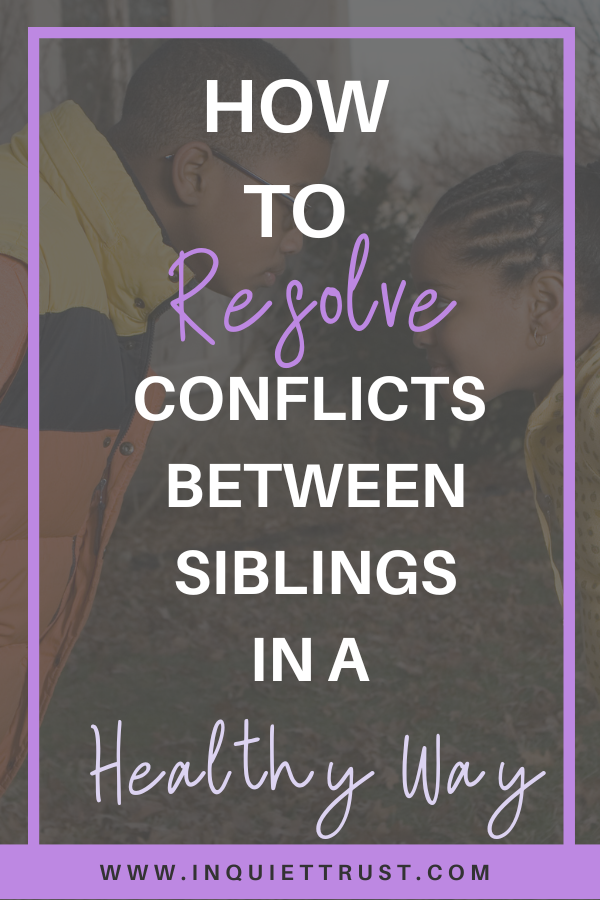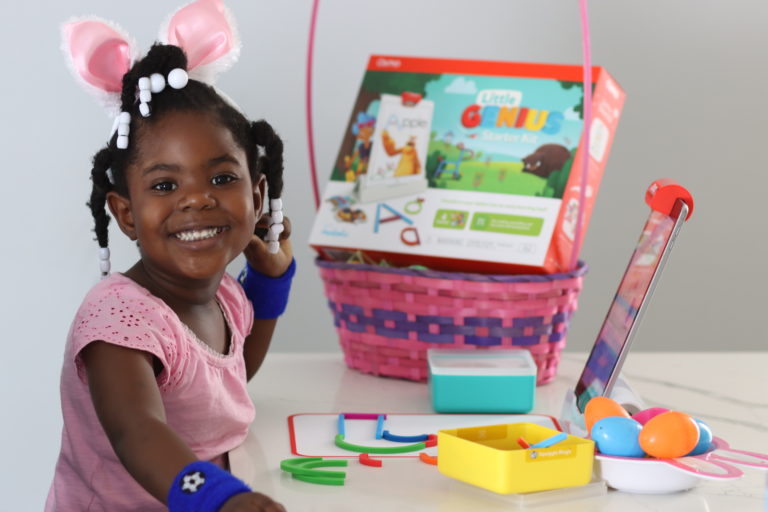How to Resolve Sibling Conflict in 8 Healthy Ways
It’s saddening that some sibling conflicts can extend until adulthood, and we all know it is sinful to hold a grudge. Knowing the line between normal sibling fights and full-blown rivalry is paramount for a godly parent. This blog post comes from a place of concern to show Christian parents how to resolve sibling conflicts healthily.


No matter how close siblings are to each other, there are moments when they seem to forget how much they love each other. As parents, especially mothers, it is necessary to know how to resolve conflicts between them. When resolving sibling conflict, the point to note is to make sure there is forgiveness and love at the end of it all.
Meaning of Sibling Rivalry
Sibling rivalry or sibling fights is a word that describes the arguments, shoutings, and full-blown fights that happen between kids in the same family. If kids live together in the same house, there is every chance that they will bicker, tattletale, argue, and fight (physical or verbal).
Usually, these actions are considered a manifestation of a deeper cause. For example, your 13-year-old kid can shout at your 5-year-old because of the age difference, puberty, or desire to gain attention from you. This is why parents must identify the root cause rather than address only the manifestations.
How much sibling rivalry is normal?
Sibling fights are usually considered normal, although they can quickly become aggravated because of the inability of kids to control their emotions. There are times when you can just overlook some actions, but other times, it needs strict addressing.
As usual, and as often as siblings can fight, it gets to a level where it’s just wrong and abnormal. When the arguments occur more frequently, the words exchanged are too expensive, and it doesn’t seem to end—one fight leading to the other, the use of hateful comments, being spiteful, and even bullying.
You have to observe the relationship between your kids. If one child is being deliberately left out of interactions, being ganged up on, outrageously pranked, mocked, or sneered at, you might want to discuss it with your children.

Let the Holy Spirit guide you. As much as you check with your physical instincts, check with the spiritual.
RELATED POSTS:
- Make Easter Magic with Osmo Little Genius Starter Kit – In Quiet Trust
- Indescribable for Little Ones Board Book by Louie Giglio: Review
- Get Osmo Coding Starter Kit: Review – In Quiet Trust
Causes of sibling rivalry
Personality differences
Yes, they share the same blood, but it doesn’t mean they will always think alike. One kid might like to actively express their feelings while the other might be a bit withdrawn; in the same way, one might prefer a quiet environment while the other doesn’t. Clashing personality types aren’t strange, even between twins.
Individuality
It has been observed that kids like to express themselves as different and unique to set themselves apart. As a parent, it is best to let your kid identify with themselves and come to that state of personal awareness. If you are in the habit of categorizing your kids together, you might want to stop it. It makes them want to actively set themselves apart from their siblings by engaging in unhealthy comparisons.
Resentment
Unresolved feelings of unfairness can result in resentment among your kids, such as lingering feelings of insecurities, lack of attention, or preferential treatment of a child more than the other. Sometimes, all your kid wants is some level of attention from you, and if they feel you give more attention to another sibling, it can create a rivalry and become the standpoint for future conflicts.
Transfer of aggression
This occurs mostly among older children. Stress from school activities, frustration over projects and assignments, or even heartbreaks can cause your kid to transfer aggression to their siblings. It usually doesn’t last long, and finding out the cause solves the issue.
Puberty
If your child is going through puberty and experiencing some body changes, it doesn’t just stop there. Their personality also changes. For example, your girl who would usually hang out with her much younger siblings can start to act withdrawn and irritated with them.
Competition
It is unhealthy for siblings to consider each other a threat, and when this happens, they begin to compete with each other to prove that they are better.
Desire to gain attention
Conflicts might arise when your child feels you give more attention and praise to another sibling. This usually occurs when there is a new baby in the house or when you have a child that requires special (typically medical) attention.
How to resolve sibling conflict
There are specific actions to take before, during, and after these conflicts. And I will advise you to interfere when your kids get into arguments or full-blown fights, maybe not at that moment but find a way to address it.
As parents, you need to be alert constantly, check on your kids’ behavior toward each other, and ensure to pray about those situations.
I’ve seen sibling fights get so nasty that they project into adulthood and pass it to the next generation. We don’t want that, and this is why I have these pointers on how to resolve conflict between siblings in a healthy and definitive way.
1. Be calm
Imagine trying to get dinner done on time, and you hear shouts from the playroom only to get there to see them fighting over who gets to hold a spiderman toy.
There are worse scenarios than this, and it can be challenging to be calm, but you have to. Sibling conflicts get nastier as they grow older: it grows from fighting over toys to fighting with hurtful words, physical hair-pulling, and maybe punches.
The first rule to resolving conflicts between your kids is for you to be calm. If you are too worked up, you might not get to see a clear picture of the situation, identify the cause, and resolve it constructively.
2. Listen to both sides
Everyone has their version of the story, and usually, these versions are biased and vindictive. When your children fight, please pay attention to all sides of the story; listen to them separately and ask them to recount. As they explain what happened, ask them to describe their own actions clearly.
All this is to help you fully understand what happened in your absence and know the root cause of the conflict.
3. Teach constantly
Resolving conflicts goes beyond the moment the conflict occurs. It also involves what you do before and after—educating your kids on how to manage differences, the importance of family, how to stay calm during arguments, and other skills that can help them resolve conflicts healthily. This will help them develop conflict resolution skills that can be useful when they become adults.
This simple action can be in the form of educational books, media, or just some conversation over games or cooking. It helps your child develop communication skills, learn how to be assertive and confident, and manage relationships better.
4. Correct appropriately & Scold fairly
After listening and deducing why the fight happened in the first place, you must find a way to correct the actions and reactions. It takes two to tango, and you should make them understand the concept.
It also helps because it prevents one child from thinking that you gave preferential treatment to the other, resulting in more severe conflicts in the future.
If you need to correct or scold, do that to both parties.

5. Create a conflict resolution strategy
This tip is essential for subsequent conflicts and when you are not around to step in. You should create a strategy for your kids to be able to solve these conflicts themselves. It could be similar to how you resolve conflict with your spouse or something that the kids are familiar with.
I watched a movie where the mother would take a nail cutter, give it to the kids and ask them to cut each other’s nails while saying “I love you” to each other. Yours doesn’t have to be so dramatic, but it should be able to bring your kids to a neutral ground, at the very least.
6. Set rules
Set a ground rule they shouldn’t cross even when they are furious. However, when you set ground rules to minimize and manage sibling rivalry, you want to make sure that these are things they’ve seen you do.
Discuss consequences for breaking the rules with your kids, so it doesn’t look like you are too harsh on them. When they break the rules and have to face the consequences, they know that it was what they agreed to.
To make it fairer for your kids, you can apply these rules to you and your husband, but the consequences might differ. That depends on a lot of things.
7. Encourage communication
Teach your children to communicate, especially when you have a quiet kid in the mix or a kid who can’t express themselves properly. You can encourage communication by showing patience and understanding, and the fact that you show these things alone will encourage your child to speak themselves freely.
If you have an issue getting the accurate version of events, you might consider taking the people involved and the bystanders into the room separately.
8. Avoid comparison
Making comparisons between kids is so unhealthy. It can create issues between siblings, unhealthy rivalry, and even a lack of self-esteem. It affects kids’ individuality and makes them feel like they constantly need to compare themselves with others or measure their successes and failures by that of others. There is no beneficial effect of comparison.
Also, you should watch those actions that can be interpreted as favoritism or preferential treatment—for example, scolding one kid while leaving the other alone, permitting one while you reject the other, buying things for one more than the other, and other related actions.
Children will always fight for attention because that’s who they are. It is up to you as their parents to ensure they do not feel unloved or not preferred.
Let’s Recap
No matter what age siblings are, it is impossible to avoid conflicts once in a while. Yes, conflicts are bound to happen, but they can be minimized and managed. When these fights get you overwhelmed, please get on your knees. Never underestimate the heartfelt prayer of a mother for her children.
Cheer up!
Did you find these tips helpful? Do you have a personal strategy for conflict resolution among your kids? Care to share? Leave a comment below with your responses.
If you’ve made it this far, I want to thank you for sticking around and reading this post. Leave a comment below to let me know you stopped by. Please be sure to like, pin, and share this post as well! Your support means everything! If you’ve enjoyed this post and want to see more like it, or receive a short weekly devotional, be sure to subscribe to my newsletter below!
- READ ALSO: Best daily morning devotional books for kids – In Quiet Trust








4 Comments